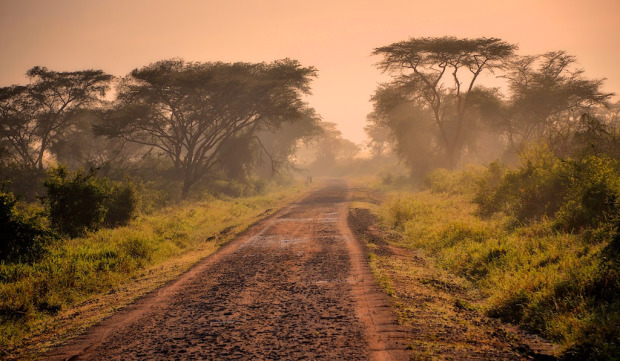You have no items in your cart. Want to get some nice things?
Go shopping
Uganda, 1989
Stephen never minded a care in the world when it was hot like this, like Uganda was the sun itself. He just go to work in the fields every day after school – he have to get money for our foods, he say. So loyal. So ree-spon-sible. Even when he was just a small boy he talked like that – sometimes I asked myself, ‘Has he got a man inside him with man’s thoughts and words? God, I pray to you it is not the Devil.’ But always my son would look after us – me and his younger brothers and sisters – and so I knew it could not be the Devil.
His father went away to work in Kampala a long time ago. At first he would come home every few months to see his family – and to make it grow – but I have not seen him for five years now, and we do not talk about him much. He is still there, he still sends some money.
Stephen learned his hard work from him all the same. He was not like his friends. They were lazy like grey-straggled dogs in the heat who try to eat our food while doing no-good tricks on each other and even on elders in the village. At school, too, he was different. He was a sunflower and they were all potatoes, heads muddy with earth and dirty things. They could get away with that because Stephen would always look out for them. Explained their lessons, taught them football tricks. But he was not a leader. He was not interested that they saw him as their leader. I thanked God for him every day.
Sometimes he helped his uncle polish shoes in the town. He would come back to the village all too full of tired excitement, like a river carrying more water than it could hold, because he’d polished and spat and scrubbed those men’s shoes so hard that he could see his face gleaming back at him. One time he came back all sad. Sad and qui-et. He must have been thinking the whole walk home. Thinking is no good for someone so young. I asked him was there anything wrong and he told me, ‘Today, all the men’s shoes had too many creases in. They were like wrinkles round an old man’s eyes – I couldn’t make them shine enough to see my face, no matter how hard I spat and scrubbed.’
I said – well I just told him, ‘If they broke their things then it’s not your problem – they’re not paying you to fix them, just to make them look better than they are.’
His eyes when he got frustrated like that became silted up with darkness. I wanted to put my hand in and pull out that thing that stood in between us. Tug at it till it came clean away and left him in peace.
Stephen was my firstborn. His eyes were round and black and the white parts were brown-red like the earth. He didn’t smile very often. Judging the world, he was, making up his mind for himself before agreeing with everyone else. I admired him for that.
When he was eleven, he went to the senior school in town. He walked all the five miles there and five miles back home again every day. Many of his friends from our village found they had to overcome their laziness, for their parents took them out of school and sent them to work in the fields or the town. I told Stephen he must stay at school. Learning – knowing things – is how you have a different life – or that is what I thought. Now I am not sure.
Joseph lived in the next village and walked the same path to school, and he and Stephen became friends. He was older and saw something in my son that his other friends did not. The first time he visited our home he was still shy of eighteen, and yet he behaved as if he were the man of the house. He would sit up very straight, with one arm coiled over the back of the chair.
‘Your son does not have enough tea, niabo,’ he would tell me. ‘Give him some more.’
Always polite, and yet it was an order. I was not afraid of him – I could not be, when Stephen was always so relaxed in his company – but… He had a red soul, an anger in his heart like an animal who feels that everyone is walking him backwards into a pen he can’t escape from.
The conversation when Joseph was visiting was changeable like the winds as a storm comes in – it was exciting, I will admit that. Still as a man not wanting to be found one minute, then raging like wildfire, then empty, all emotion thrown from the body. His favourite subject was God, and Stephen soon learnt to talk about Him with a new sort of reverence. Joseph would give him private lessons on the way to and from school about how the people of Uganda should live by God’s word, not man’s. The Ten Commandments, they were the law, and they should be followed. I had always taught him this, to live quietly by God’s law, yet he felt it more deeply having heard the words from a man he looked up to.
One day, when the air was heavy with unfallen rains, Stephen went to fetch some water and left Joseph and me alone.
‘Why have I never seen your husband?’ he sneered. ‘Are you a prostitute?’
I jumped like a cricket at the aggression in his voice but reached up for a cup from the shelf to disguise it.
‘That is not for you to ask, boy. But since you do: no, I am not. My husband is working – earning money for his family. Perhaps you should do the same for your parents and sisters instead of spending time with mine, pretending you are a part of it.’
After Stephen’s first year at his new school, Joseph left. But he still came to our home, ‘to nurture him,’ he said, ‘to teach him his duty and educate him about God.’
I began to make myself absent when he appeared, though Stephen remained eager to tell me about their meetings.
‘Joseph has trusted me to teach other students at my school about peace and God and compassion,’ he said once, but for all his openness, his eyes watched the corner of our room and his fingers twisted around one another.
Then I overheard one of the lessons. I had been to the next village to get some water because a chicken had fallen in our well and was making everyone sick. It was a hot day and I wished myself a little younger and the way a little shorter. I saw a group of boys up ahead and thought I might get one of them to help me in return for a shilling or some food. As I came closer, I saw that they were all looking at one man – he was scarcely a man – and listening, unmoving, to the insanities coming from his mouth.
‘We must all fight for the Lord. Fight until those who do not believe in His laws learn to believe, or are killed for their disloyalty to Him. Who is with us? Who is in God’s army?’
A small cheer, quieter than the man’s voice, came uncertainly down the path.
I was losing my nerve about asking one of them for help. Perhaps they would not be willing. Perhaps they would even be emboldened to ask if I was with them.
‘Who is with us?’
A louder cheer this time, but then a cry: ‘His laws must be kept with peace – peace−’
The dissenter’s voice was pressed down by all the others, a scream from under water, as the boys mobbed in on one another. But I heard it clearly. It was then that I saw Stephen stumbling out of the group, hands slapping him on the back, rubbing his shoulders, his short hair.
I moved into the trees beside the path and looked away, pretending to be occupied with fixing my shoe. When the boys had gone I resumed my journey. My arm shook all the way to my village, though the water felt weightless.
Two years ago, my family sat in the black that comes after sunset. There were no clouds and no moon, only the stars gazing down without blinking, boring their eyes through our thin leaf-like roof. It was the blackest night I ever lived through. All of us were silent as we chewed our rice and stew, slowly, savouring the juices that ran down our throats. We were almost blinded then by a bright white flash, and the light stayed in the air as if suspended, and we could see the bushes and the shape of the next village against an orange canvas. I saw Stephen’s eyes, too. He was not in them; he had hidden away inside himself.
The next morning, he was gone.
I have heard a story going around in whispers. It says that a boy – a man – from this village has been arrested in the Congo. They say that he was once Joseph Kony’s right hand man in the Lord’s Resistance Army; that he was stalking the land alone, crossing rivers by foot, moving through the green bush made thick by the rains. And always at night so no one would see him or know where he was going. They caught him when he was stealing away from a food store in the lifting dark, having filled his stomach as he pleased.
I do not know how he can eat anything, if he has done the things they say.
They say he has popped eyes from their sockets with a machete as if they were sweet cherries ready to be plucked from a tree. That he has raped mothers and shot the knees of their children, causing them to snap like pieces of elastic and their feet to twitch in the dust so the child resembled a writhing snake.
I do not need to hear the rest, if there is anything else to hear. And I know why they whisper to one another but do not come to tell me: they are hoping I will hear and come to them with the story myself, so that they can shake their heads with sadness – not for me, but for their own families; for the state of our small world. How satisfying that would be for them.
When Stephen left us, my youngest son kept asking, ‘Where is my big brother? Does he not want to play with me anymore?’
He said it so many times it became a song echoing in my head – an echo that was never answered. I think I had known for some years that he would leave. If I am honest, I knew from the first time Joseph visited him in our house. But I know my son is a good man. He will come home to his mother and ask for forgiveness.

About Rosanna Boscawen
Rosanna Boscawen's short stories have been published by Liar's League and .Cent magazine, and she has written for The New York Observer, Prospect magazine and The Observer New Review. She grew up in Suffolk and now lives in London.




